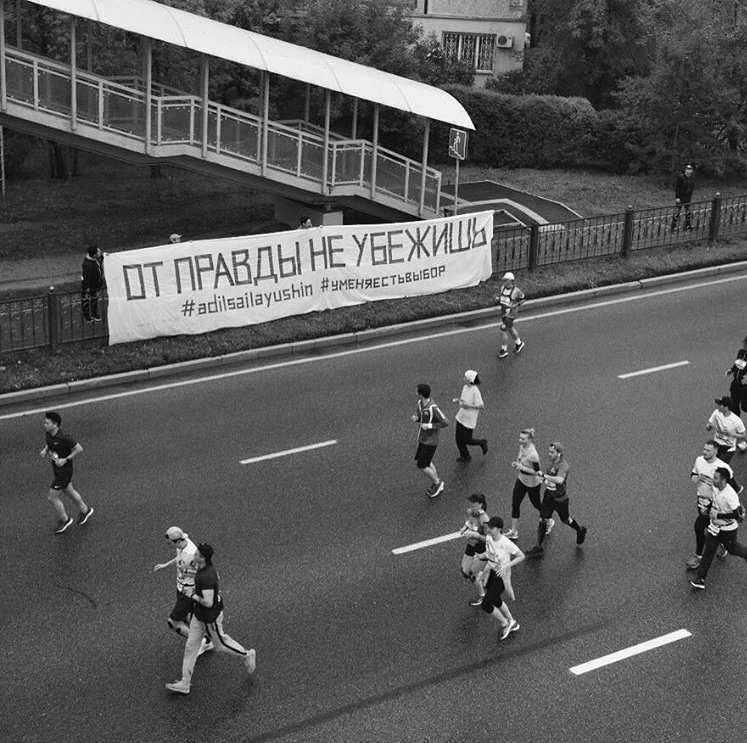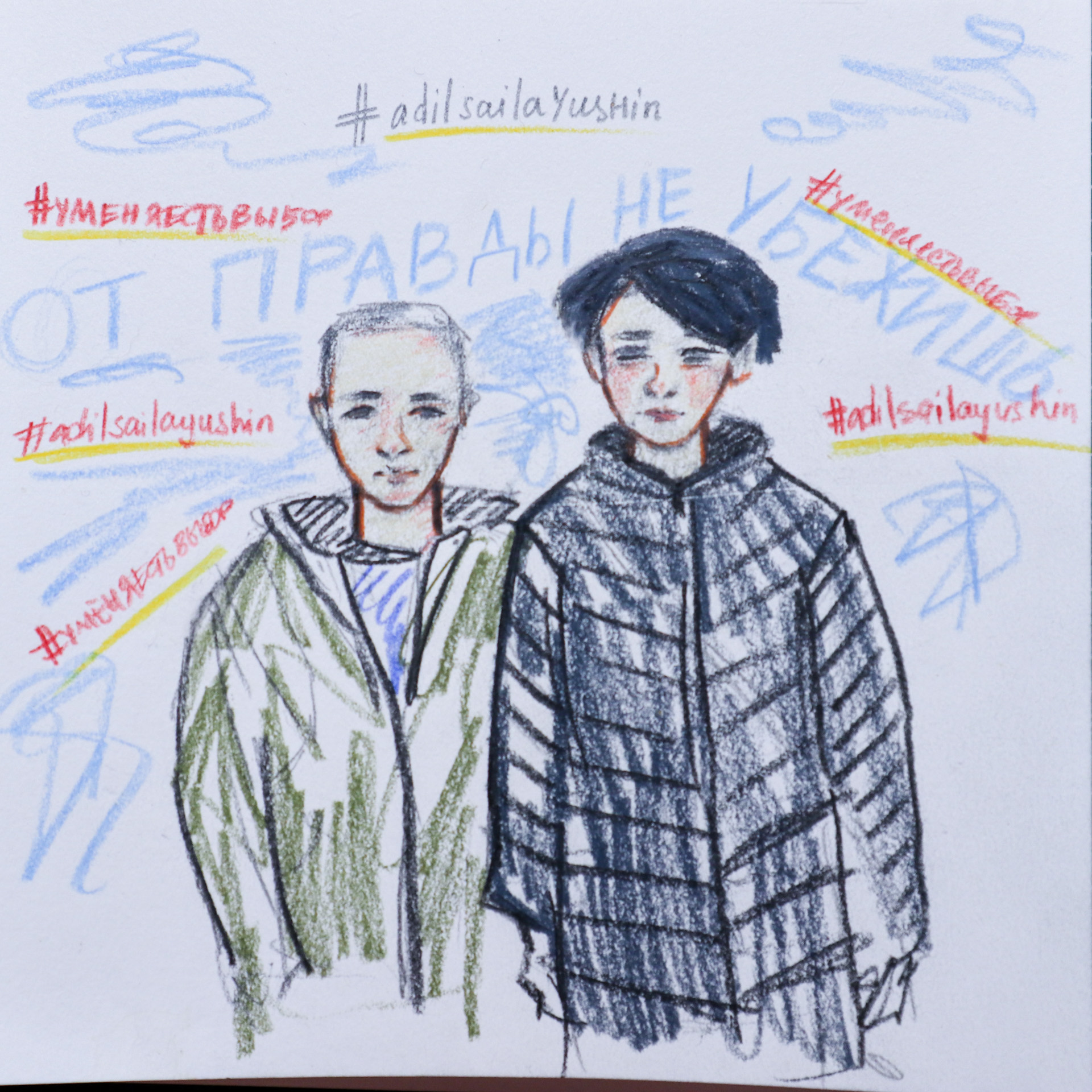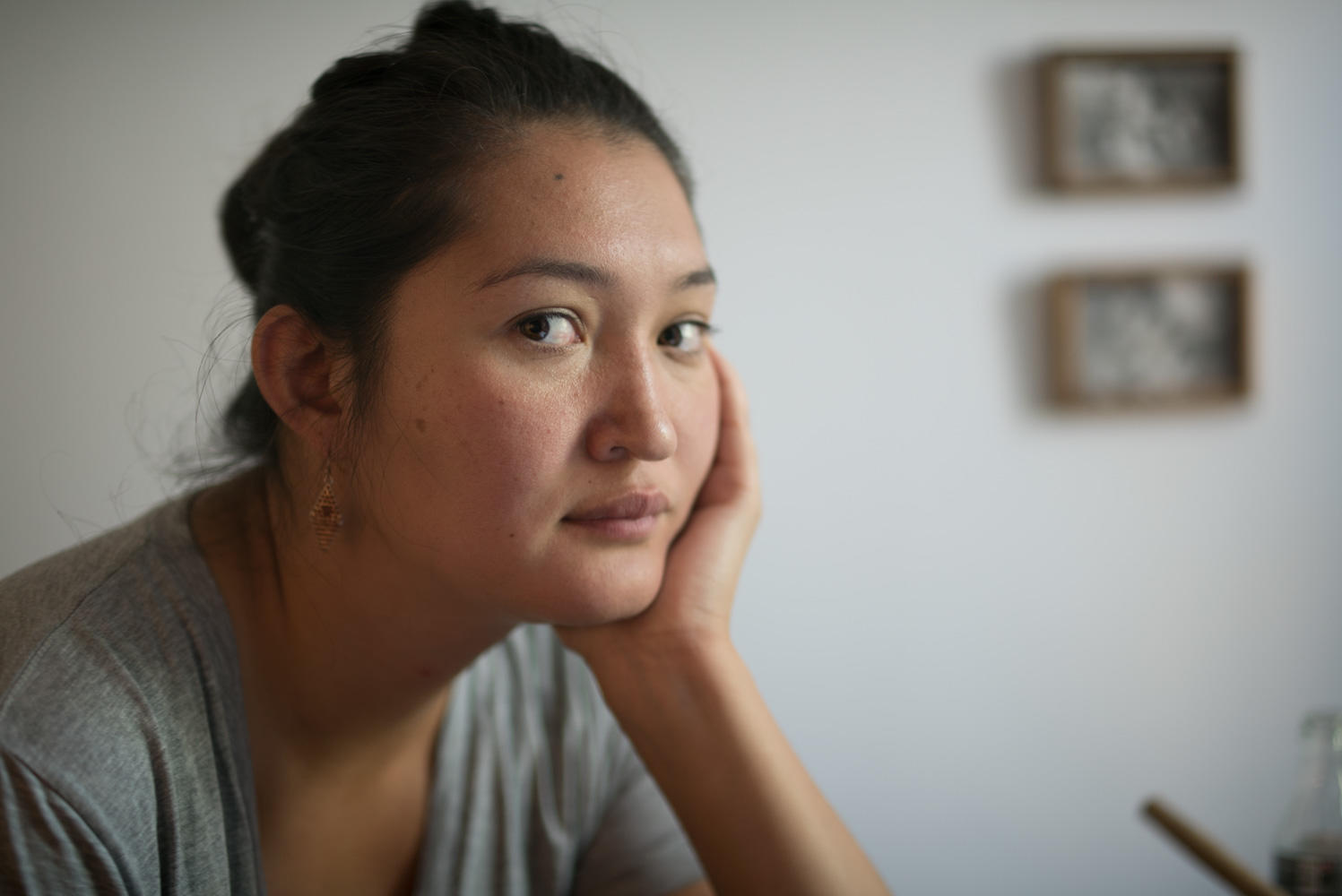On the evening of April 21, in Almaty, Kazakhstan, trials against civil activists Asiya (Asya) Tulesova and Beibarys Tolymbekov were held. Both Tulesova and Tolymbekov were found guilty under administrative article 488, paragraph 3, and sentenced to serve 15-day prison terms for their demonstration during the Almaty Marathon — holding a banner which read, in all capital letters, “You cannot run from the truth,” above the hashtags #AdilSailayUshin (“For Fair Elections”) in Kazakh and #УМеняЕстьВыбор (“I Have A Choice”) in Russian. During the trial, Tulesova gave a public statement, in which she addressed the motivations behind her demonstration and gave her thoughts on the trial, the environment, sports, and democratic values. Additionally, she recalled the tragic death of the national figure-skating hero Denis Ten in 2018 and the case of the murderer, Ussenov. Here, Adamdar/CA publishes the abridged version of Tulesova’s statement and her answers to the judge and prosecutor.

Date: April 21, 2019, evening
Place: Almaty interdistrict court
Asya Tulesova: I acted on my conscience. Presidential elections have been announced for June 9, and I think this is an important moment in the life of every Kazakhstani citizen. We might finally hold honest, fair elections. But, unfortunately, our system is designed in such a way that it does not allow real candidates, ordinary citizens, to have the opportunity to announce their candidacy in the presidential race, which I think is very important. Our demonstration was dedicated precisely to this problem. Beibarys and I came out and said: “Guys, let’s all get together and have real independent elections.”
I consider what is happening now to be a crime — not my crime before the state, but the state’s crime against me as a citizen of Kazakhstan, given that we have a Constitution that gives us freedoms, such as the freedom of speech. [...]
Judge Arbayev: What was your goal?
Tulesova: My goal was to draw people’s attention to the fact that we need to unite together and hold fair, independent elections. Any elections — for the President of Kazakhstan, for judges, and, of course, for mayors. We want our executive branch to be held accountable to citizens, as it should be.
Prosecutor: From what you’ve just said, it seems that you connect the banner in question with politics, although you previously stated that it was directly referencing the marathon.
Tulesova: Of course. I think it’s a very witty banner. [...] It says “You cannot run from the truth,” and people really are running from the truth. Even those who interrogated us, it turns out, also ran in the marathon. It seems to me that in this outburst of energy, we forget about some of the important, urgent problems Kazakhstan is facing. For example, corruption — corruption in law enforcement agencies or corruption in the courts, or the very corruption which keeps us from changing or somehow improving the state of the air quality in Almaty. There is a multitude of problems.
Prosecutor: Do you agree that your banner does not refer to sports or to the marathon?
Tulesova: It very much refers to sports. It’s as if its text is saying, “You can run, but sports will not take the place of…” That is to say, “sports is a good thing, but having sports and an active civil position is even better.”
Prosecutor: All right, but what does the content on the outer portion of the banner mean?
Tulesova: “I have a choice”? “I have a choice” means that I have a choice. I want people to realize that we need to learn how to build democratic institutions which really work. We need a good President who will be held accountable to the population, and who will also take care of the quality of life of their own people.
These are the simple truths. We are for simple truths, as, I’m sure, you are, too. You want your children to grow up in a clean city. You want Ussenov, if he comes for your son or daughter next time, to get what he deserves! Does that make sense? We are for such simple things. We are against corruption, we are against the idea that students and the poor can be forced to go and give up their votes…
Prosecutor: Let’s get to the point.
Tulesova: This is the point. And it’s all on one single banner. Can you imagine?
We want, if we’re going to have an election, to teach our students to think, not just to go and give their votes based on a command. Let’s teach our judges to judge those who are guilty, not just by order. Let’s teach our law enforcement agencies not to persecute political activists, but to protect the people. Just to protect the people. There are people who want to live, they want to build. This is what my and Beibarys’ demonstration was all about.
And I’m sure that each of you, Mr. Prosecutor, you, Your Honor, secretaries — you all want this for our government. I’m with you. Everyone who came here, everyone wants the same thing. I understand; this is a difficult time, but it seems to me that until we learn how to express our opinions and speak honestly, directly, and openly about our desires, we will remain in a system which will only devour us, and we will rot away and lose our country. Do you understand?
It was a small banner. It was just a small cry — everyone, we have a huge, gorgeous country! Let’s lift it up, let’s make it more gorgeous, let’s build it together! Let’s allow our students to move progress forward. Let them come out and protest. Let them have freedom. Let them write the most beautiful songs. Let’s not be afraid to let our sons out of the house, fearing that maybe someday his car mirror will be stolen, he’ll chase after the thieves, and then he’ll just...he’ll just be gone, you know?*
*Denis Ten (1993–2018) was an outstanding figure skater, bronze medalist of the 2014 Winter Olympics, silver medalist of the 2013 World Figure Skating Championship, and a national hero of Kazakhstan. On July 19, 2018, in the center of Almaty, he came upon two thieves in the process of stealing a side mirror from his car. One of the criminals inflicted a deep knife wound on Ten, who died two hours later from his injuries. The death of Denis Ten was a national tragedy for Kazakhstan and for fans of figure skating all across the world.
You also want more for this country. But until we start to make new decisions and start building the institutions we dream about, nothing will change. Every day, each one of us makes our own decision. What I’m saying is “Let’s make decisions — the right decisions. Decisions that are based on honor.” We all grew up rooted in these things: honesty, freedom, kindness, love, intelligence. These are simple truths. When you leave the institutions that break you, break your souls and your minds, you come home later a completely different person. You want a wonderful, wonderful Kazakhstan for your children. Nobody wants to leave…
Judge Arbayev: Let’s get to the point.
Tulesova: This is the point. It may sound very naive, but this is exactly what the banner is about. And Beibarys, when he took his stand, he thought about this. I just don’t get it, I can’t understand...it’s so strange that, in this country, we can have a boy — he’s only 20 — who served in the army, he didn’t run or make up excuses to get out of serving, who was given 15 days only for the fact that he said “Let’s have an honest election.”
Let’s have an honest election. [...] it seems to me that we need to get to some kind of point where we say “That’s it. From this moment I will try to live better.”
Judge Arbayev: Is this banner political in nature?
Tulesova: In this context, the banner is political in nature.
Judge Arbayev: It was a picket. A peaceful picket.
Tulesova: What even is a “picket?” Give me the definition of a picket. I think that it was a demonstration.
Judge Arbayev: A peaceful demonstration that raised political issues?
Tulesova: Of course. But, look — when I talk about how Almaty residents need clean air, it also is a political issue, because the problem of air quality in Almaty is very political. The interests of big companies and the city are involved. Such basic, simple things — they are all political. Our whole lives are politics, you know?
In her final remarks to the court, Asya Tulesova said: “I would like to remain with Beibarys in prison for as long as he is not given his freedom.”
Both Tulesova and Beibarys were found guilty, and sentenced to serve 15-day prison terms. On April 23, while behind bars, Asya Tulesova went on hunger strike to declare her disagreement with the court’s decision. Neither Tulesova’s family nor the public knew about her decision until April 26 as the attorney had not been allowed to the arrested activists.
Amnesty International recognized Asiya Tulesova and Beibarys Tolymbekov as prisoners of conscience and stated that they had been “detained for the peaceful expression of their views.”
Asya Tulesova and Beibarys Tolymbekov’s demonstration marked the beginning of a wave of artistic protest by the youth and creative class that was unprecedented for Kazakhstan and Central Asia. Banners, posters and street art objects appeared, and solidarity efforts took place in different cities of Kazakhstan and around the world: Almaty, Astana, Karaganda, Uralsk, London, Berlin, New York, Prague, Budapest, Paris, Los Angeles, Milan, etc.

This material was kindly translated from Russian by Kate Herrington-Kobekpaeva.
